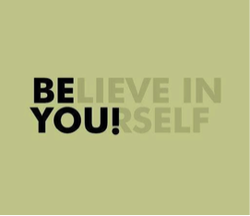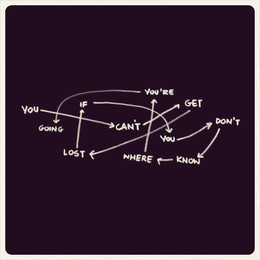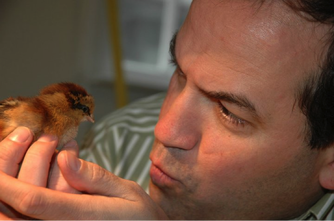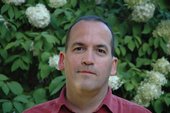 "You have to believe in yourself before anybody else can believe in you" -Ray LaMontagne There was a time in my life when I’d hear a saying like the one above and think, “They have it all backward. If someone else were to believe in me, I’d know I have something to offer.”
It’s not unusual for us humans to look to others for validation … to figure out if we’re “good enough” or likeable. Earlier in my life, I found myself in situations, -- either in college or in a particular job, for example, -- where I felt stuck and unsure about how I could contribute. It was emotionally painful for me to be in that place of uncertainty about my own value. So I adopted unhealthy habits, looking to those around me and doing what they did or saying what they said. In other words, my thinking was that they were smarter than I could ever imagine being. I would ask myself, “What does believing in you mean?” and “How do I start to believe in myself?” Unfortunately, these questions remained unanswered for many years. Eventually, with the help of therapy, books and so many self help seminars, I discovered the answers. I replaced self-doubt with self-acceptance. The experience of believing in myself was powerfully liberating. I was no longer trapped in the painful feelings of uncertainty and self-doubt. In a recent coaching session with a client, I asked, “What does believing in yourself look and feel like to you?” Here is a sample list of responses we put on the white board in the office: · Knowing that no matter what happens in life, you will be OK. · Feeling courageous in the face of perceived adversity. · Seeing that others’ opinions are just that:, their opinions and not facts. · Having a healthy level of self-awareness and acceptance. · Loving oneself without a doubt. · Being comfortable with taking risks. · Getting to define yourself with confidence. · Being aware of how you can personally impact others for the better. · Assuming accountability for maintaining a healthy sense of self. Now you may be wondering to yourself, “So how do I go about believing in myself?” The first thing is to make a personal commitment. Tell yourself that you want to live life where believing in yourself. It all starts with desire and motivation. Below are some tips to consider:
So, do you believe in yourself? If not, are you ready to step up and leave the feeling of being stuck and unhappy behind? What steps will you take? If you do believe in yourself, please share what has worked for you. Be well. Be loved. And, of course, Be yourself ! Tom
0 Comments
 Don’t get me wrong, but I do find therapy exceptionally helpful for dealing with many life events. Trust me, I am speaking from experiences. And ask anyone who knows me, I would suggest therapy in a heartbeat. About five years ago, during a conversation with a friend, while discussing my dislikes with my high paying tech job, she asked me to explore “life coaching”. I went home and jumped on the Internet and found so much information to absorb. Eventually, I found my passion and calling in life. My inner core came screaming alive with each word I read, describing the profession of coaching. Something else became obvious while i was reading countless pages of materials. I noticed a pattern of a particular word kept appearing. The word was “Action”. To me, when i tell people what I do for a living, I tell them that Life Coaching is a “Action” oriented process. It can transform your “feelings” and “thoughts” into “results”. The "results" people are wanting ranges from improving self confidence, stop worrying too much, listen less to others opinions or even finding one's purpose in life and so much more. In my humble and humorous opinion (based on hundred of hours of personal experiences), therapy is very much “feeling” oriented. Don’t misunderstand me, experiencing and understanding your “feelings” is vital to human survival. But the reality is that most people come to me for “results”. They are exhausted from “thinking” and “feeling” too much. Up all night, tossing and turning wondering how to quiet the mind or calm their nerves. These folks want relief and in some cases, are pretty desperate to make their issue(s) go away or quiet down. Life coaching offers relief and sense of control in one’s life. During the process, you will be reminded of things you knew and learn some new tools you did not know. So, if you are tired of “feeling” and “thinking” too much and seriously want some “results”, contact me for a free session. Think less, Act more. “I don’t know what to do….”
This is a very popular phrase in my line of work. Each time I meet with someone for the first time, I am met with one, who is likely, at a crossroad in his or her life. They start off with a story about how they arrived at my doorstep. Confused with details and unsure of where to start, most proceed to tell me with self conviction, “I don’t know what to do…”. Once they are done with expressing their concerns, I then tell them I have some good news and some not-so-good news. Their faces light up with excitement and a sense of hope, that they may be freed from what is troubling them. I would tell them, First the good news….”There is nothing wrong with you, that is correct, there is NOTHING wrong with You.” The various expressions on their faces are priceless. They are surprised at the announcement and slowly you can see a sense of hope that they may actually believe what I just said. Then, they would ask, “Well…what is the not-so-good news?” I would reply with a smile and say, “The not so good news, is that it will be tough trying to convince you that there is NOTHING wrong with you.” Often is the case, they met my answer with amusement and a sense of hope. “Seriously”, I would say, and continue telling them “ The issue is not YOU but the way YOU think”. I would then continue to share that I have read somewhere that we, as humans, make over 65,000 or more choices a day. That's right, we make so many choices and we usually start day with the choice to open our eyes, from a night of rest. If we make so many choices, then like anything, we must be making some good choices, right? So now back to that opening phrase, “I don’t know what to do…”. Now that I have shared two valuable points with you, one being that the issue is with your thinking and the other, is that you have experiences making many great choices, we then move forward to exploring what to do with your issue. I have a tool, called “ What I Want” Matrix, which involves making a box on a piece of paper with a line drawn down the middle. At the top of the box, I would name the first column “Don’t Want” and the next one, “Do Want”. With the matrix in mind, I then ask the individual to make a list of what they do not want in their life at this time. Once they are done, I then ask that they make a list of you do want. Many clients have reported they don't know how to make a list of what they want and they feel feel stuck. Then, I would reply by saying “But you do” and then continue to tell them, “The easy way to figure out what you want is to write down the opposite of what you listed that you don’t want.” Below is an example. As shown, one has listed "Unhealthy relationships" is something they don't want. Well, what is the opposite of that? As you can see, one was able to write down the opposite, which is, "Healthy relationships". Don’t Want Do Want Unhealthy relationships Healthy relationships Abusive communication Loving communication Negative thinking Positive thinking Being unhappy To be happy with self Once we have identified what it is that you want, we then move onto the “how” part of the coaching session. Amazing things have happened with those I have worked with. For proof, check the testimonies shared on this website. Or Contact me for a free session, to experience it for yourself. So the next time you find yourself saying, “I don’t know what to do”, pull out a piece of paper and use this tool and see what you come up with, you may surprise yourself. The title for this post, "Put you first", is something I say often, with those I work with. Upon hearing it, most individuals express frustration in putting themselves first. I would hear “But I was raised to put others first” or “ Being selfish is bad” or even “ But the bible says you shall love your neighbor as yourself.” It was pretty clear to me that most people, like myself were experts at taking care of others’ needs. It was the “right” thing to do. I was so good at honing in on your issues but when it came time to inquire about mine, I stumbled. Like most people, putting others needs first started at a very young age. I was taught to put others’ needs first and not to focus on myself, as that would be an act of selfishness. In the last 20 years, serving others is what I did best. Every job I had was primarily to focus on helping others to identify and get their needs met. I was the counselor who honed in on your issues and quick to follow with a solution. Then I was a mediator, where I knew what the needs were well in advance before those involved did. As an IT System Administrator, I had to project possible issues with the computers before the customers did. I would proudly create pie charts, identifying potential bottlenecks and offering resolutions to management. As a result, I would receive excellent compensation and feedback for my efforts to serve the customers’ needs. In was in this job, after 10 years of working with customers and computers, I started to notice something was not right. I was not satisfied with my well paying job. I found myself lacking happiness and purpose. I was starting to feel resentful in taking care of others’ needs instead of my own. This unhappiness was apparent with management and they confronted me with a powerful question, “was I passionate about my role in the company?” I could not answer, as I did not know. I was unclear about what makes me happy. At a friend's wedding, I was talking with another guests about my struggle trying to find a job I could be passionate about. She listened to all I had to share and suggested I explore life coach as a profession. I took it upon myself to explore what exactly is a life coach on the internet. After a brief time on the internet, I discovered that being a life coach was my calling in life. Without a doubt, I was destined to serve in a role where I could take better care of myself and others at the same time. After being in this role for about three years, I like to consider myself something other than a "life coach". I like to refer to myself as a "Wayfinder", one who supports others, in their busy lives to find their way back to the true self. Having found my true calling in life and taking better care of myself, I am in a powerful position to support those who want to find their way to their true self. My question to you: where in your life are you putting yourself first? |
Tom Ellis, CPC
Tom is a Path Finder who is solution & action focused as well as a Life Purpose Specialist. Artist & Gentleman Farmer.
|




 RSS Feed
RSS Feed